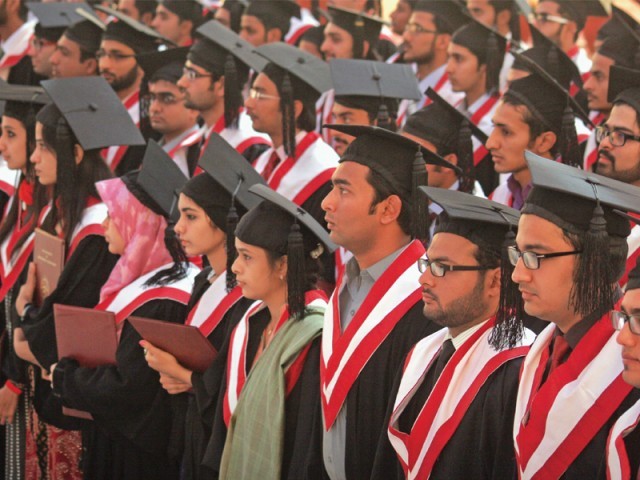PakAlumni Worldwide: The Global Social Network
As technology begins to permeate every aspect of life in Pakistan, the country needs a balanced mix of highly skilled workers, technicians, mechanics, technologists, engineers, researchers and development scientists to meet the challenge. Recent launch of National University of Technology (NUTech) is part of Pakistan government's response to this challenge.
21st Century Workforce:
Pakistan's economy is rapidly transforming from traditional agriculture to modern business and industry. Accelerating penetration of smartphones, personal computers, flat screens, mobile broadband, indoor plumbing, motorized vehicles, home appliances, air-conditioners, tractors, tube-wells, advanced construction machines and solar and other technology-based products and services requires a highly skilled workforce to design, manufacture, market, sell, operate and service.
Building this new highly skilled work force must begin with designing curricula and facilities. It also demands a new crop of trainers and educators and closer collaboration between academia and industry.
National University of Technology (NUTech) Campus in Islamanad |
NUTech Launch:
National University of Technology (NUTech) has just been launched as a federally chartered institution of higher learning. It is enrolling students now for its first academic semester starting in September 2018.
NUTech will not only produce hands-on engineers and scientists but it will also serve as an umbrella organization for training skilled technicians and tradespeople to build, service and maintain advanced technology-based plant and equipment.
NUTech will work with a national network of technical and vocational training institutes to produce skilled workers. It will include representatives of business and industry in design of curricula to ensure these workers meet the needs of the industry.
Specialized Institutions:
Pakistan Air Force's Air University, established in 2002, is an example of a specialized institution aimed at developing human capital in the aviation sector.
Development of a new advanced fighter is a wide-ranging effort that will encompass building human capital in a variety of fields including material science, physics, electronics, computer science, computer software, electrical engineering, mechanical engineering, aerospace engineering, avionics, weapons design, etc.
Air University has added a new campus in Kamra Aviation City. The university already offers bachelor's master's and doctoral degrees in several subjects. Pakistan Air Force Chief Sohail Aman told Quwa Defense News that the campus will “provide the desired impetus for cutting-edge indigenization programs, strengthen the local industry and harness the demands of foreign aviation industry by reducing … imports and promoting joint research and production ventures.”
Higher Education in Pakistan:
There are over 3 million students enrolled in grades 13 through 16 in Pakistan's 1,086 degree colleges and 161 universities, according to Pakistan Higher Education Commission report for 2013-14. The 3 million enrollment is 15% of the 20 million Pakistanis in the eligible age group of 18-24 years. In addition, there are over 255,000 Pakistanis enrolled in vocational training schools, according to Technical Education and Vocational Training Authority (TEVTA).
Graduation Day at NED Engineering University For 1300 Graduates in 2013 |
Pakistani universities have been producing over half a million graduates, including over 10,000 IT graduates, every year since 2010, according to HEC data. The number of university graduates in Pakistan increased from 380,773 in 2005-6 to 493,993 in 2008-09. This figure is growing with rising enrollment and contributing to Pakistan's growing human capital.
Higher education in Pakistan has come a long way since its independence in 1947 when there was only one university, the University of Punjab. By 1997, the number of universities had risen to 35, of which 3 were federally administered and 22 were under the provincial governments, with a combined enrollment of 71,819 students. A big spending boost by President Pervez Musharraf helped establish 51 new universities and awarding institutions during 2002-2008. This helped triple university enrollment from 135,000 in 2003 to about 400,000 in 2008, according to Dr. Ata ur Rehman who led the charge for expanding higher education during Musharraf years. There are 161 universities with 1.5 million students enrolled in Pakistan as of 2014.
Former Chairman of HEC summed up the country's higher education progress well in a piece he wrote for The News in 2012: "Pakistan has achieved critical mass and reached a point of take-off. For this phenomenal growth to continue, it is important for the government and other stakeholders to support and further strengthen the HEC as a national institution and protect its autonomy. If this momentum continues for another 10 years, Pakistan is certain to become a global player through a flourishing knowledge economy and a highly literate population".
Here's an introductory video about National University of Technology (NUTech) Pakistan:
Related Links:
10 Pakistan Universities Among Top 300 in Asia
Pakistan's Growing Human Capital
History of Literacy in Pakistan
Education Attainment in South Asia
Dr. Ata ur Rehman Defends HEC Reforms
Biotech and Genomics in Pakistan




Riaz Haq
Netsol Announces to Establish Its Own IT University
Posted 8 hours ago by ProPK Staff
https://propakistani.pk/2020/12/18/netsol-announces-to-establish-it...
This is encouraging news from the industry for software houses, professionals, and students alike. A university to be set up based on industry and academic coordination could serve the entire IT sector, which is always looking for graduates having skills in advanced fields of IT sector.
Presently, a majority of local universities except a few institutions do not produce graduates that meet the requirement of the local and foreign markets. Hence, a serious shortage of human resources always prevails in the sector.
According to industry estimates, as many as 25,000 graduates graduate from various universities per year in Pakistan. However, merely 5,000 graduates can meet the requirements of the industry regarding the needed skill sets and other practical qualifications.
Ministry of Information Technology and Telecommunication (MoITT) had previously planned to set up an authority on IT education last year under the then minister. However, there is no update on the continuity of the plan under the present minister.
Stakeholders of the IT industry said that professionals of various software houses could impart their knowledge at various institutions to bring reforms in IT education. However, they said that the universities are not willing to pay them competitive salaries.
Therefore, inexperienced teachers continue to teach various subjects of computer science to students through an outdated curriculum and obsolete methodologies.
Some big names in the IT industry usually set up their in-house training departments to meet the demand for human resources. However, this is not a long-term solution as far as the entire industry is concerned.
At present, the demand for the IT industry is exceeding 15,000 professionals every year, with over 5,000 highly-skilled professionals required in the latest technologies.
Companies have no choice but to pick up professionals from competing companies at higher offers of salary packages.
It is hoped that setting up an IT industry by a reputed IT company could make a difference in meeting the demand of the country’s IT companies in the future rather than money-making and degree-printing institutions.
Dec 18, 2020
Riaz Haq
In 1962, a landmark legislation laid the foundation of vocational training in Pakistan. The Apprenticeship Ordinance, 1962 was promulgated by the government of Gen Ayub Khan to feed the growing industries with skilled technicians and process operators.
https://www.thenews.com.pk/print/854127-vocational-training
This was followed by the Apprenticeship Rules in 1966, which quite comprehensively provided modalities of the training scheme, obligations of both the employers and apprentices and the latter’s terms and conditions of apprenticeship.
The Ordinance of 1962, has been made applicable to undertakings employing fifty or more persons, as are notified by the provincial government in the official gazette. The notified undertaking is obliged to introduce and operate an apprenticeship programme and get it registered with the Competent Authority defined in the Ordinance.
Such undertaking is required to train apprentices in the proportion of a minimum of twenty percent of the total number of persons employed in the ‘apprenticeable trade’. For instance, if an undertaking employs five electricians, it should have at least one apprentice in this trade. There are more than three hundred vocational professions to choose from, encompassing different areas.
The induction of the Ordinance met with immense success and all the notified undertakings established their apprenticeship centers in accordance with the law. The most notable among them was the remarkable apprenticeship training center established by the American corporate giant Exxon Chemical Pakistan Limited at its fertilizer plant in Daharki (Sindh).
In the late 1960s, the Exxon corporation was attracted to install a plant in Pakistan looking at its rapid pace of industrial development. The company not only imparted training to apprentices in mechanical and chemical trades for two to three years duration but also devised a competitive scheme for their career development in the post apprenticeship employment of the company. Exxon’s successor company Engro Fertilizer Limited continues to follow the scheme.
The federal government has promulgated the Apprenticeship Act, 2018 by repealing the Ordinance of 1962, which has become outdated. However, due to the 18th Amendment, provisions of the act of 2018 extend only to the Islamabad Capital Territory. The provinces should make and enforce their own apprenticeship acts, to revive the effectiveness of a most beneficial training scheme.
In order to supplement the apprenticeship scheme and boost vocational training in the country, the government promulgated the National Training Ordinance, 1980, which was amended through the Amendment Ordinance, 2002. The purpose of the ordinance was to constitute training boards in the respective provinces to regulate and promote vocational training facilities in various fields. By virtue of this ordinance, the scope of vocational training has widened beyond the confines of notified undertakings. While the apprenticeship training extends only to the apprentices enrolled with some undertaking, any person whether or not he/she is employed, can join the vocational training institutes established all over Pakistan, to learn the desired skill.
The National Board has 17 different functions relating to promotion of technical, vocational and in-plant training and skill development etc. The provincial boards have nine functions, which include: (a) registration and licensing of establishments, organizations or institutions, which are offering vocational training; and (b) conducting trade tests and certifying the skilled persons and trainers, who may have received vocational training through any source or acquired the skill through experience or informal system of Ustad-Shagird.
Most of Pakistan’s blue-collar workers learn their work informally and have little to no formal academic education. However, raw potential is not a substitute for proper industrial skills-based training.
Jun 26, 2021
Riaz Haq
First solar school project in Pakistan inaugurated at Benchmark School
https://www.nation.com.pk/24-Sep-2023/first-solar-school-project-in...
According to Ms. Kulsoom Tanvir, Principal of Benchmark Schools, “We are very proud of being the first solar school project in Pakistan. The idea behind this project is to engage the youth of Pakistan in the areas of climate change and renewable energy resources. We appreciate all our students, teachers and project partners and hope to continue and build upon such projects in the future.”
The solar school project aims to spark the enthusiasm of the young generation for renewable energy sources, particularly in countries in which the awareness of renewables is still low. As a part of the project, local installers place a solar system specially designed for teaching purposes, which is then integrated into school lessons. The solar schools are also provided with so-called solar suitcases, which are used to integrate the topic of solar energy into physics lessons in a practical way with interactive experiments. The project started in 2021, funded by the German Federal Foreign Office. Before Benchmark School, 4 schools joined the project and network, in Tashkent (Uzbekistan), Karshi (Uzbekistan), Almaty (Kazakhstan) and Astana (Kazakhstan).
Sep 28, 2023